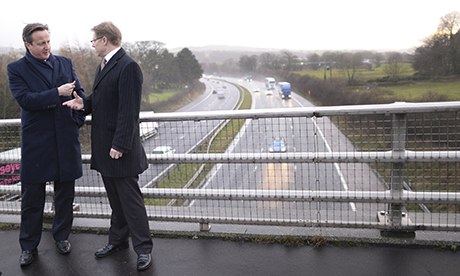
There is a delicious, if uncomfortable, clarity about the decisions made by public bodies. Large wheelbarrows full of indigestible strategy documents, mission statements and proclamations about the importance of climate change, green belts, nature protection, sustainability and public health are routinely ignored when councillors, highway engineers and planners get down to the real work of building new roads or paving the countryside with thousands of new homes.
The Heysham M6 link road (HM6L) is a perfect example of this 'clarity'. The new road is directly contrary to a large number of policies at local, regional and national level that deal with the green belt, habitat protection, sustainability, greenhouse gas reduction and the promotion of walking, cycling and public transport. None of these policies have been allowed to dilute the case for the new road and its £128m price tag, all of which is from public funds.
This is only a small road in a small corner of NW England and £128m is not much money compared to the cost of new airports, motorways or high speed rail lines so why does it matter?
It matters because in Britain we like to think we are quite good at rationality, evidence, best value, avoiding waste and optimal decision taking and in fact we are very bad indeed.
It matters because we are in the middle of savage cuts to budgets that reduce front line services to many millions of citizens so it is not acceptable to throw money at a scheme costing "only" £128m when there are much better things to do with that money.
It matters because ordinary citizens who are very good at reading research reports and evaluating evidence are being ignored, and this brings the whole system of democratic accountability into disrepute.
It is a 4.8km stretch of dual carriageway road connecting Junction 34 of the M6 with the already heavily congested Morecambe Road that connects Lancaster with Morecambe has been promoted for many years by Lancashire County Council even though Lancaster City Council voted to oppose the route in 2007.
The declared purpose of the road has changed over time depending on the audience and the conversation with funders at the Department for Transport in London, but the main strands are the reduction in congestion in Lancaster, the boost it will give to economic development in this small area of North Lancashire and the support it gives to the port of Heysham.
The evidence shows that new roads built in these circumstances do not reduce congestion; they generate new traffic. Evidence also shows that new roads are just as likely to drain jobs away from a local economy as they are to attract those jobs.
There is very robust official evidence that clarifies the impact of new roads on a local economy. The new road may attract jobs but it may drain them away - the so-called "2-way road effect". There is no reliable evidence that leads to the conclusion that a new road will not create jobs and there is no detectable difference in new jobs created between those areas with access to new roads and those without this access.
A considerable amount of evidence on the HM6L road based on official reports has been presented to Lancashire County Council, planning inspectors and the Department of Transport to show that the claims made for the new road are illusory. The road cannot deliver its own objectives. On Friday 13 December DfT confirmed that it would fund the road.
Quite understandably many local residents caught up in a system that blatantly ignores evidence will become disillusioned with politicians, experts and public bodies, and this reduces trust and cohesion in society as a whole. It also matters if we get things wrong. Part of the explanation behind rising greenhouse gases in transport, increasing rates of obesity, poor air quality resulting in 29,000 deaths per annum, and social exclusion is that we get things wrong when we examine a large funding proposal like the Heysham M6 link road. There are better things we can do with our money and there are solutions to all these problems but we are choosing to make things worse rather than better.
John Whitelegg is a member of the Stockholm Environment Institute, and is visiting professor of sustainable transport at Liverpool John Moores University.
• Want your say? Email sarah.marsh@theguardian.com to suggest contributions to the network
Not already a member? Join us now for more comment, analysis and the latest job opportunities in local government







